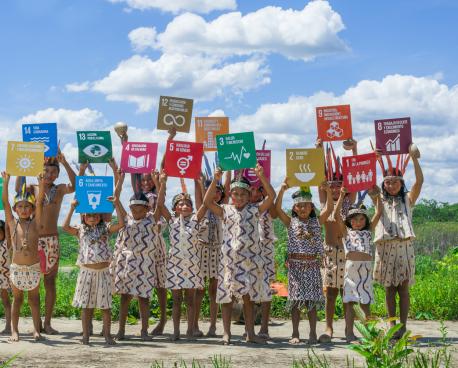The United Nations Sustainable Development Group System-Wide Evaluation Office (SWEO) conducts system-wide evaluations and provides evidence on the contribution of the United Nations development system towards the achievement of the 2030 Agenda for Sustainable Development and the Sustainable Development Goals (SDGs).
This evidence goes towards making timely decisions, strengthening transparency and accountability and incentivizing collective learning in the system.
To ensure independence, impartiality, and credibility, the SWEO is a standalone, independent office within the United Nations Secretariat. The Executive Director reports to the UN Secretary-General.
Learn more on the UN SWEO website.
System-Wide Evaluation
System-wide evaluation constitutes a whole-of United Nations approach with a focus on collective performance, results and learning. It is the only evaluative function for assessing the combined contributions of entities across the entire United Nations development system to the implementation of the 2030 Agenda.
System-wide evaluation activities follow the provisions of the UNSDG System-Wide Evaluation Policy (2024).
Read the UNSDG System-wide Evaluation Policy.
There are two types of system-wide evaluations within the United Nations development system:
1. System-wide evaluations
The universe of potential topics for system-wide evaluations conducted by the UNSDG System Wide Evaluation Office encompasses:
- Priorities for the United Nations development system set out in the Quadrennial Comprehensive Policy Review (QCPR)
- Priorities emerging from intergovernmental summits and resolutions
- United Nations system-wide strategies and plans
- Pooled funds and joint initiatives in which United Nations entities are working towards a common objective
The number of evaluations varies from year to year with details set out in the multi-year Global System-Wide Evaluation Plan
Browse through the Documents Library.
2. Cooperation Framework Evaluations
Mandatory system-wide evaluations of the United Nations Sustainable Development Cooperation Framework (Cooperation Framework) are commissioned and managed by Resident Coordinators (RCs) in collaboration with United Nations Country Teams (UNCTs) to ensure accountability, support learning, and inform decision-making regarding subsequent Cooperation Framework cycles. Conducted in the penultimate year of the Cooperation Framework cycle, these evaluations assess the contribution of UNCTs towards the achievement of national development results and the SDGs.
Read the Evaluations of Cooperation Frameworks.
Management Response and Follow-up
All system-wide evaluations require a formal management response produced within an agreed timeframe and published along with the evaluation reports.
The United Nations Development Coordination Office (DCO), as the UNSDG Secretariat, facilitates the preparation of management responses for global system-wide evaluations conducted by the SWEO which are published here.
For Cooperation Framework evaluations, the Resident Coordinator, in collaboration with the UNCT, is responsible for the preparation of the management response.
Browse through the Management Responses for Cooperation Framework Evaluations.
DCO, as the UNSDG Secretariat, also maintains a system-wide evaluation management response and follow-up database for all system-wide evaluations and works with United Nations entities to facilitate reporting on the implementation of the management responses through existing mechanisms.
System-Wide Evaluation Use
System-wide evaluations provide important evidence for key users at country, regional and global levels. The SWEO works to raise awareness about and promote the uptake of system-wide evaluation evidence in cooperation with DCO, the United Nations Evaluations Group (UNEG), the United Nations System Staff College (UNSSC), the United Nations Institute for Training and Research (UNITAR) and through partnership with other relevant United Nations and international evaluation and evidence bodies.


